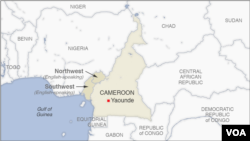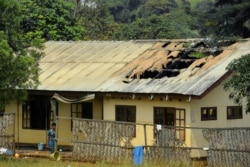Civilians in Cameroon’s restive English-speaking regions have braved separatists’ threats and reopened close to 140 of about 475 schools closed by fighters in the last four years.
Some Anglophone activists have, for the first time since the crisis began, backed the civilians in the initiative to reopen closed schools, while some fighters are threatening to abduct teachers and students who resume classes. But hundreds of children, who have been deprived of education, and their teachers are returning to the schools despite threats.
Roland Ngwang, the highest government secondary education official in the English-speaking North-West region says many parents are sending their children to schools closed by separatists four years ago.
"Anybody in the region who is a parent is passionate and determined because for four years running now, the effect of the crisis has been quite serious in the region. This tells you that we have parents and students who are so resilient, who are very determined to get themselves completely invested in the activity of education," he said.
Ngwang said close to 15,000 students have been present in the schools since Oct. 5, when the 2020-2021 school year started. He said only 2,000 students were present in September last year when the 2019-2020 school year began.
Evelyn Adamu, head teacher of Government Primary School in the English-speaking northwestern village of Binka, said she received more than 600 children in the first week of the school year. She said the children and their teachers are counting on the government for protection.
"When the crisis started, the boys (fighters) burned the office in this school and a classroom, so we had to escape. We have come again this year and we know that God being there for us we shall succeed. We want to thank the administration. We want to thank the military who have been there, the vigilance group (militia) of Binka who have been there fighting for us and supporting us," Adamu said.
The government said 40 schools in the English-speaking South-West region also reopened this week. The schools were closed in 2017 following repeated abductions of teachers and students, along with the torching of infrastructure by separatist fighters.
Eric Tataw, a U.S.-based Anglophone activist says he is encouraging schools to reopen. He said it is unhealthy and an abuse of human rights to deprive children of education. Tataw said their dream country, Ambazonia, will need educated citizens to foster its development.
"As a liberator, you work based on the aspirations of the people. We have to give the command. Parents, guardians and the children themselves, wherever security conditions permit, those children have the right to go to school. Enough is enough. All fighters, protect our children to go to school when they want to go to school," Tataw said.
Not all Anglophone activists and separatists are unanimous about reopening schools. Hong Kong-based separatist spokesperson Daniel Capo says schools managed by the central government in Yaounde will not be allowed to operate in the English-speaking regions.
"We shall permit community schools that have been approved by the Ambazonia governing council education board. We shall not tolerate any alien institution any longer. Our forces on the ground shall enforce this order," he said.
Capo said the group calling itself the Interim Governing Council Ambazonia, the nation they are fighting to create, is working with communities to determine which community schools will be authorized to function.
Tataw, though, said such an initiative will not work because no curriculum has been developed and teachers would not be sure of their salaries. Tataw said such schools cannot function without infrastructure.
The government has promised to protect all teachers, students and their schools. It also has called for the creation of militias around schools to inform the military of any strange movements and visitors.
Cameroon’s four-year separatist conflict has left more than 3,000 people dead and half a million displaced, according to the United Nations. The crisis started in 2016 when teachers and lawyers took to the streets to complain about the overbearing influence of the French language in the bilingual country.
The military responded with a crackdown and separatists took up weapons, claiming they were defending civilians. They asked for a school shutdown and vowed to make the English-speaking regions ungovernable.





